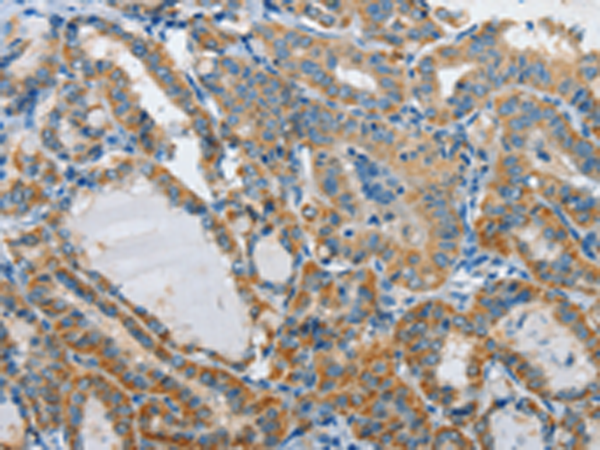
| WB | 咨询技术 | Human,Mouse,Rat |
| IF | 咨询技术 | Human,Mouse,Rat |
| IHC | 1/25-1/100 | Human,Mouse,Rat |
| ICC | 技术咨询 | Human,Mouse,Rat |
| FCM | 咨询技术 | Human,Mouse,Rat |
| Elisa | 1/2000-1/5000 | Human,Mouse,Rat |
| Aliases | HLP; CCPI; CGL1; CSPB; SECT; CGL-1; CSP-B; CTLA1; CTSGL1 |
| Host/Isotype | Rabbit IgG |
| Antibody Type | Primary antibody |
| Storage | Store at 4°C short term. Aliquot and store at -20°C long term. Avoid freeze/thaw cycles. |
| Species Reactivity | Human |
| Immunogen | Fusion protein of human GZMB |
| Formulation | Purified antibody in PBS with 0.05% sodium azide and 50% glycerol. |
+ +
以下是关于GZMB(Granzyme B)抗体的3篇代表性文献的简要信息:
---
1. **文献名称**: *Granzyme B in immune responses: Mitigation of sepsis and autoimmune disease*
**作者**: Trapani, J.A. et al.
**摘要**: 该研究探讨了Granzyme B在细胞毒性T细胞和NK细胞介导的靶细胞杀伤中的作用,并评估了特异性抗体在抑制过度炎症反应(如脓毒症)和自身免疫疾病中的应用潜力。
2. **文献名称**: *Antibody-based detection of Granzyme B improves the diagnosis of cutaneous T-cell lymphoma*
**作者**: Dummer, R. et al.
**摘要**: 研究团队开发了一种高特异性GZMB抗体,用于通过免疫组化检测皮肤T细胞淋巴瘤(CTCL)患者的组织样本,显著提高了诊断准确性,并揭示了GZMB表达与疾病进展的相关性。
3. **文献名称**: *Granzyme B degradation by autophagy affects tumor cell susceptibility to cytotoxic T-cell killing*
**作者**: Afonina, I.S. et al.
**摘要**: 该文献利用GZMB抗体研究肿瘤细胞中自噬途径对GZMB的降解机制,发现抑制自噬可增强GZMB介导的肿瘤细胞凋亡,为癌症免疫治疗提供了新靶点。
---
这些研究涵盖了GZMB抗体在疾病诊断、治疗机制及实验工具开发中的关键应用。如需更多文献或具体领域的研究,可进一步补充说明。
**Background of GZMB Antibody**
Granzyme B (GZMB) is a serine protease primarily secreted by cytotoxic T lymphocytes (CTLs) and natural killer (NK) cells. It plays a critical role in inducing apoptosis in target cells during immune responses, particularly in eliminating virus-infected or malignant cells. GZMB is stored in cytotoxic granules and released into immune synapses, where it cleaves substrates like caspases to trigger programmed cell death.
Antibodies targeting GZMB are essential tools for studying its expression, localization, and function in immune processes. These antibodies are widely used in techniques such as Western blotting, immunohistochemistry (IHC), and flow cytometry to detect GZMB in research models or clinical samples. They help elucidate mechanisms of immune surveillance, cancer progression, and autoimmune disorders linked to dysregulated GZMB activity.
GZMB antibodies are typically developed using recombinant proteins or peptide immunogens, with validation emphasizing specificity (e.g., knockout cell controls) and cross-reactivity across species (human, mouse). Monoclonal antibodies offer high consistency, while polyclonal variants may detect multiple epitopes. Recent applications extend to therapeutic monitoring, such as assessing checkpoint inhibitor efficacy or granzyme-mediated cytotoxicity in cell therapies. Challenges include distinguishing active versus inactive forms and minimizing nonspecific binding in complex tissues.
Overall, GZMB antibodies remain pivotal in advancing immunology and oncology research, bridging mechanistic insights with translational diagnostics.
(Word count: 245)
×